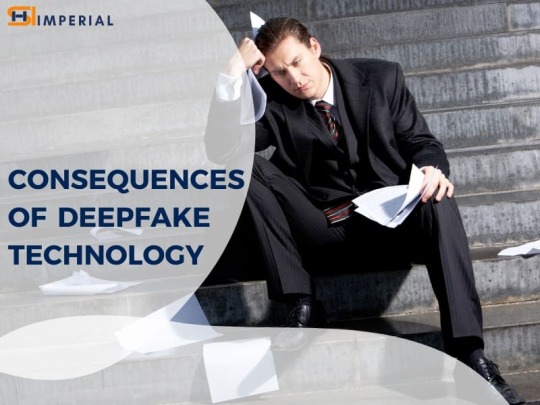#DeepFakeDilemma
Text
Consequences of Deepfake Technology

INTRODUCTION:
Deepfake is a technology that uses deep learning to create realistic and frequently deceptive digital content. It is one of the new technologies that have emerged from the rapid growth of artificial intelligence. Deepfakes are a remarkable technological achievement, but their effects go far beyond amusement. This article explores the complex ramifications of deepfakes, looking at how they affect misinformation, privacy, trust, and wider societal ramifications.
To achieve a future where privacy, truth, and trust are vital, we must navigate the complex landscape of synthetic realities while striking a balance between innovation and upholding social ideals.
Periodically, social media companies have received advice from the Ministry of Electronics and Information Technology to utilize caution and act quickly to stop deepfakes.
Privacy Erosion:
Because deepfakes make it possible to manipulate digital content—including audio and video recordings—they represent a serious danger to people's privacy. The possibility of misusing personal information to create false narratives or engage in extortion or defamation is raised by the capacity to superimpose someone's likeness onto made-up circumstances.
Deficit in Trust:
The prevalence of deepfakes undermines confidence in the veracity of digital content. People may get more dubious of the information that is given to them as the line separating truth from fiction becomes more hazy, which could foster a widespread atmosphere of mistrust. This may have an effect on a variety of fields, including journalism and interpersonal interactions, where trust is essential.
Political Manipulation:
By producing fake statements or movies that inaccurately portray public personalities, deepfakes have the ability to upend established political systems. Deepfakes used maliciously in political situations have the potential to sow strife, sway public opinion, and disrupt the democratic process, hence endangering elections and governance integrity.
Disinformation Spread:
The likelihood of disinformation is increased by the ease with which deepfakes can be produced and distributed. Misinformation, made-up claims, and contrived incidents have the ability to spread rapidly online, causing general confusion and social instability. An era already dealing with the fallout from disinformation is made more difficult by deepfakes when it comes to separating real content from fake.
Risks Associated with Identity Theft and Cybersecurity:
Deepfakes create additional difficulties for both identity theft and cybersecurity. The capacity to convincingly assume the identity of another person can result in financial fraud, illegal access, and the compromise of private data. For both individuals and organizations to protect themselves from this new danger, cybersecurity measures must be strengthened.
Effects on Journalism and Authenticity:
The emergence of deepfakes puts journalism's core values and the pursuit of truth under jeopardy. The public may grow increasingly dubious of news reporting and journalistic integrity, and journalists may encounter greater difficulties in confirming the veracity of media information.
Effect on Reputation:
Deepfake information that damages people's reputations can have serious repercussions for both private citizens and public personalities. It is possible to purposefully create fake audio or video recordings that show someone participating in improper or unlawful behavior, seriously damaging their reputation both personally and professionally.
Difficult Legal and Ethical Issues:
The rise of deepfakes presents difficult legal and moral issues. It may be difficult for current regulations to keep up with the quick development of this technology, which makes it difficult to hold developers liable for improper use. It is important to carefully analyze the ethical implications of manipulation, consent, and the proper application of AI technology.
Legal Concerns: The legality of deepfakes in the US is complicated. Defamation claims can be made by victims, however material removals could be interpreted as censorship and could therefore be against the First Amendment, which safeguards the rights to petition, assembly, expression, and religion.
On the other hand, users have the ability to ask organizations like Google and Facebook that have gathered their data to remove it through the Right to be Forgotten.
Effect on Creative Expression:
Although deepfakes are bad, they also push the limits of what is considered acceptable creative expression. Filmmaking, entertainment, and digital art are among the industries that will be impacted by the application of deep learning to create realistic digital material. It becomes crucial to strike a balance between the right use of this technology and creative freedom.
In conclusion:
Deepfake technology has serious ramifications that society must address as it develops. The effects of deepfakes are felt in many facets of contemporary society, from the invasion of privacy to political manipulation and the dissemination of false information. A complex strategy that incorporates legislative frameworks, ethical principles, technological breakthroughs, and public awareness is needed to address these difficulties. Finding a balance between innovations and defending social values is crucial as we negotiate the complicated terrain of synthetic realities in order to secure a future in which privacy, truth, and trust are paramount.
#ReputationDamage#IdentityTheftRisk#MediaManipulation#AuthenticityCrisis#DigitalDeception#TrustErosion#FakeNewsConsequences#ManipulatedReality#EthicalImplications#DeepFakeDilemma
0 notes